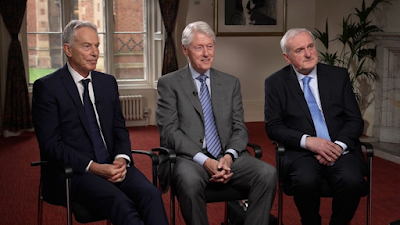If there is a guy that gets my bile up as much as Trump, it is Bill Clinton. I can't stand when he gets dragged back in the news, especially for something he played very little role in. Yet, here is hogging up the limelight on the 25th anniversary of the Good Friday Agreement. George Mitchell was the chief negotiator for the US in reaching this historic power sharing agreement in Northern Ireland. Bill just happened to be president at the time, bogged down in the Monica Lewinsky scandal that for a brief moment threatened to undo his presidency. What was left of it anyway.
Bill has been offering a lot of mea culpas recently, like getting Ukraine to give up its nuclear arsenal in the 1994 Budapest Memorandum in exchange for security guarantees and a pathway toward EU ascension. That didn't work out very well. Russia was soon able to install a proxy in Kyiv and efforts to bring Ukraine into the European community came to a screeching halt. Bill didn't have much time to worry over it as Yugoslavia had imploded and the US was too busy trying to figure out how to carve up the former communist country for the remainder of his term.
The 42nd president was never a very clever chap. At times, he could be downright stupid, but he had this way of endearing himself to the public that made many people forgive his numerous mistakes. Not me. Each time he tripped over himself, I seethed as he drug the Democratic party deeper into a hole.
I didn't like him to begin with. His 11-year track record as Governor of Arkansas didn't suggest he would deliver on any of the promises he was making on the campaign trail. This was a guy who had repeatedly cowed to conservative interests to win re-election no less than three times. He learned after his first failed re-election campaign that progressive interests didn't hold much water in Little Rock and shed them when he ran again in 1984.
As President, there was little surprise when he dropped health care reform in the face of opposition his first year in office. This had never been more than a concession to Hillary and the left wing of the party. Instead, Bill tried to figure out how to placate Democratic conservatives by beating the Republicans at their own game. He didn't want anymore defections. Not that it did him any good in the midterm elections. Republicans took over the House in a landslide set of victories, rendering Bill "irrelevant" for the remainder of his first term. Whatever progressive legislation the Democrats had hoped to put forward under his administration was over. We were now subjugated to The Contract with America. Bill had no problem adopting these initiatives.
He managed to scratch out a second term thanks to the lack of strong Republican challenger and Ross Perot still pulling votes from independent conservatives. His lasting legacy was a balanced budget, which had been part of House Speaker Newt Gingrich's Contract. Bill had tried to turn the so-called peace dividends from the end of the Cold War into a streamlined budget. However, the biggest cuts weren't in defense but in domestic programs like health, education and welfare. Once again, tilting toward conservatives.
You would be pretty hard pressed to take away anything positive from the Clinton administration, at least from a progressive point of view. He was able to successfully fill two Supreme Court seats in his first term, more or less maintaining the balance of power on the bench. Otherwise, nada. His NAFTA agreement has been a sore point for nearly three decades. It haunted Hillary's 2008 and 2016 presidential campaigns.
Scandals plagued him throughout his presidency, which included an endless number of affairs, Whitewater, and the mysterious death of Vince Foster. There was no escaping it. Before there was Fox News, the mainstream media had no problem running with these sensational stories. Some say this unfairly handicapped his administration, but I think he actually enjoyed having these stories serve as a distraction to the lack of any real accomplishments in the White House.
The Good Friday Agreement was one of his few foreign policy victories. Sinn Fein was finally allowed to have seats in parliament, much to the chagrin of the DUP. Despite dire predictions that it would never work, the power sharing agreement has more or less held for 25 years with little in the way of violence after all those years of turmoil and unrest.
He totally botched the Israeli-Palestine peace agreements, failing in a last minute deal that would have given Palestine partial autonomy. He never forgave Arafat for it, although it was his own damn fault. Palestine would have never survived given the parameters that were set in the final agreement.
Bill left the Democratic Party in tatters after eight tumultuous years, opening the door for another unproven governor to take the White House in what could be described as the "hanging chad" election. There was no lasting legacy other than his notorious crime bill, which he later apologized for too. In short, he was a failed president and should be treated as such. However, the media still fawns over him, giving him the biggest chunk of time on CNN in commemorating the Good Friday Agreement. GFY Bill!

Comments
Post a Comment